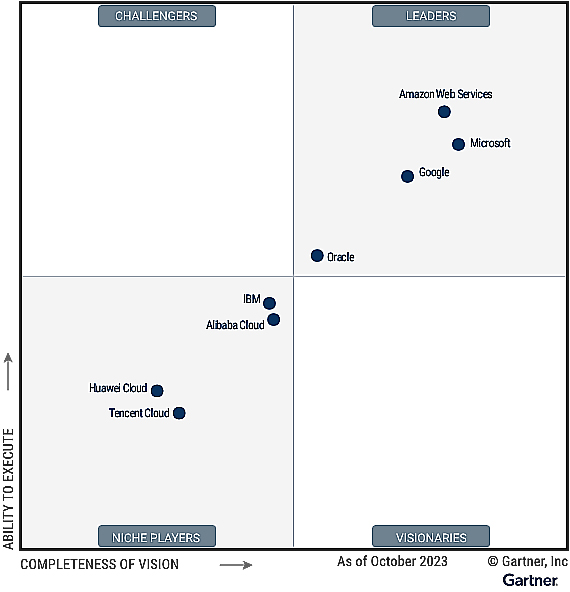Oracle has been named a Leader in the 2023 Gartner Magic Quadrant for Strategic Cloud Platform Services, previously known as Cloud Infrastructure and Platform Services.
Gartner defines strategic cloud platform services as standardised, automated, public cloud offerings integrating infrastructure services, example computing, network and storage, platform services, example managed application and data services and transformation services, programs, resources that help customers adopt cloud-oriented IT delivery models.
“We believe this recognition further demonstrates Oracle’s growth in this key category and places OCI among the four global hyperscale cloud providers in the Leaders Quadrant,” said Clay Magouyrk, Executive Vice President, Oracle Cloud Infrastructure.
“Our unique distributed cloud strategy is designed to meet our customers diverse needs and support the growing global demand for Oracle Cloud Infrastructure. Today, organisations of all sizes and across all industries rely on Oracle Cloud Infrastructure to give them the flexibility, performance, scale, and availability they need. With built-in-by-default security safeguards and better price performance than other hyperscalers, we expect to continue to strengthen our position.”
Oracle delivers IaaS, PaaS, as well as SaaS services. This enables Oracle to give customers more choice in how and where they run their applications, including across clouds or in a distributed system. This flexibility makes it easier for organisations to meet data sovereignty and other regulatory requirements.
Organisations of all sizes are using Oracle Cloud Infrastructure’s differentiated cloud services. Organisations that have moved to Oracle Cloud Infrastructure recently because it provides cloud services where and how they need them are listed here.

Oracle is a Leader in this Magic Quadrant
Oracle Cloud Infrastructure, supports all types of x86-based IT workloads through a combination of bare metal, IaaS and PaaS services. Oracle differentiates itself from other providers through its enhanced support for Oracle Applications, aggressive IaaS pricing, multicloud services, and wide variety of distributed and sovereign cloud options.
Traditionally, Oracle Cloud Infrastructure has leveraged Oracle’s leadership in the database and ERP markets to grow its market share through existing Oracle customers. However, in the last two years, Oracle Cloud Infrastructure has begun to attract more new customers of its own. Oracle recently announced a partnership with Cohere to advance its generative AI strategy.
Strengths
Distributed and sovereign cloud
Oracle is out-innovating the market in the areas of distributed cloud and sovereign cloud computing. Oracle can deploy standard commercial regions, private regions in customer data centers, sovereign cloud regions, disconnected regions and locally partner-operated regions. This range of options is valuable to customers under stringent regulatory and data privacy requirements.
Multicloud integration
Oracle Cloud Infrastructure offers high-performance interconnection with Microsoft Azure in selected regions, and has recently introduced Oracle-managed database services in AWS and Azure. These options, together with Oracle Cloud Infrastructure’s multicloud application and data integration tools, make it easier for many customers to establish Oracle Cloud Infrastructure as a second cloud adjacent to their existing primary provider.
Velocity of new features
Oracle continues an impressive year-over-year pace of feature introductions that has brought it into direct comparison with the market leaders in terms of hyperscale cloud capabilities. Oracle is demonstrating strength in DBMS, both analytics and operational, data integration, and middleware and integration platform as a service, iPaaS services, all key components needed by cloud customers for modernisation and transformation.
Cautions
Limited GenAI capabilities
In comparison to other cloud leaders, Oracle Cloud Infrastructure’s strategy around generative AI is less mature, and its messaging is muted. Currently, Oracle’s partnership with Cohere is centered around its database and Fusion products, and, despite a solid partnership with NVIDIA, Oracle Cloud Infrastructure’s AI infrastructure is not yet well-differentiated in the market.
Limited resilience options
Oracle’s most commonly deployed region architecture is one with a single availability domain, AD containing three fault domains. Currently, very few Oracle Cloud Infrastructure regions have more than one AD, and customers intending to implement high-availability architectures using multi-AD or multiregion failover may have fewer options than they expect.
Uneven sales and support experience
The Oracle Cloud Infrastructure sales field leverages its tight relationship with other Oracle business units for integrated customer management. This has mixed implications for enterprise cloud customers, many of whom tell Gartner that their concerns over Oracle’s traditional sales behaviors make it harder for them to commit to Oracle Cloud Infrastructure.
Recent offerings from Oracle Cloud Infrastructure
Oracle Cloud Infrastructure recently introduced several powerful distributed cloud offerings to the market, including Oracle Database@Azure, Oracle EU Sovereign Cloud, and MySQL HeatWave Lakehouse on AWS. In addition, increased adoption of Oracle Alloy, an award-winning cloud infrastructure platform, has seen customers such as TEAM IM and Nomura Research Institute, innovate at the speed of hyperscalers.
Oracle Cloud Infrastructure’s distributed cloud model offers customers the same 100+ Oracle Cloud Infrastructure cloud services with consistent pricing and in locations that meet their needs, providing more flexibility than other public clouds.
This enables Oracle Cloud Infrastructure to meet requirements even for customers in highly regulated industries. Oracle Cloud Infrastructure currently offers 46 public cloud regions across 23 countries, including two EU Sovereign Cloud regions, to address data residency and data sovereignty requirements in that region.
Oracle also operates separate US, UK, and Australian Government Clouds, and Isolated Cloud Regions for US national security purposes. Additionally, customers can also run Oracle Cloud Infrastructure cloud services in their own data centres while partners can customise their own branded cloud services using Oracle Alloy.
Oracle Database@Azure is planned to be available in the East US region starting in December 2023. It will enable customers to have direct access to Oracle database services running on Oracle Cloud Infrastructure deployed in Microsoft Azure datacenters.
The new service will deliver all the performance, scale, and workload availability advantages of Oracle Database on Oracle Cloud Infrastructure combined with the security, flexibility, and best-in-class services of Microsoft Azure. Microsoft is the only other hyperscaler to offer Oracle Cloud Infrastructure Database Services to simplify cloud migration, multicloud deployment, and management.
Oracle Cloud Infrastructure provides a robust infrastructure for training and serving models at scale. Through its partnership with NVIDIA, Oracle Cloud Infrastructure can give customers superclusters, which are powered by the latest GPUs in the market connected together with an ultra-low-latency RDMA over converged ethernet, RoCE network.
In addition, Oracle Cloud Infrastructure provides customers with high-performing generative AI models that leverage Cohere’s state-of-the-art large language models and are improved with Oracle’s unique industry knowledge and data insights. Oracle has embedded these generative AI services across its cloud applications, industry applications, and database portfolio, so that customers can take advantage of the latest innovations within existing business processes.
Oracle Cloud Infrastructure AI Services, including the recently introduced Oracle Cloud Infrastructure Generative AI service, provide a collection of services with prebuilt machine learning models that make it easier for developers to apply AI to applications and business operations.
Click below to share this article

